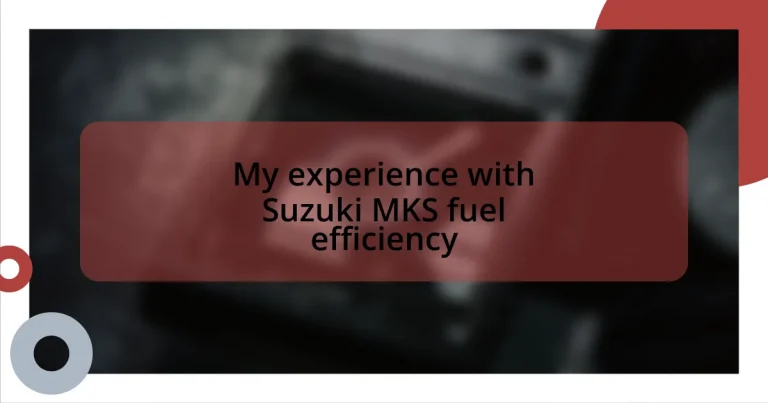Key takeaways:
- Fuel efficiency can vary significantly based on driving conditions, habits, and vehicle maintenance, as evidenced by personal experiences with the Suzuki MKS.
- Real-world data revealed a discrepancy between manufacturer estimates and actual MPG, highlighting how factors like driving route and behavior influence fuel consumption.
- Key factors affecting fuel efficiency include smooth driving habits, tire maintenance, weight load, weather conditions, and regular engine upkeep.
- Comparing the Suzuki MKS to competitors showcased its practical fuel efficiency benefits in real-world driving, despite varying official ratings.

Understanding fuel efficiency metrics
When I first started paying attention to fuel efficiency metrics, I was surprised at how much they varied depending on driving conditions. For instance, city driving often leads to lower miles per gallon (MPG) due to constant stopping and starting. Have you ever noticed how frustrating it can be to watch the fuel gauge drop quicker during those short trips?
Understanding metrics like MPG, fuel consumption rates, and energy use can feel overwhelming, but these numbers are crucial in evaluating a vehicle’s performance. I remember my friend purchased a compact SUV for its supposedly impressive fuel efficiency, only to find that it underperformed in real-world scenarios. It’s fascinating how the manufacturer’s ratings can sometimes differ from our daily experiences, isn’t it?
In my own experience, I’ve found that factors like driving habits, vehicle maintenance, and even weather conditions play a significant role in actual fuel efficiency. A well-maintained engine can truly make a difference. What has your experience been like when monitoring your vehicle’s fuel efficiency? It’s these small insights that can help us make better choices for the environment and our wallets.
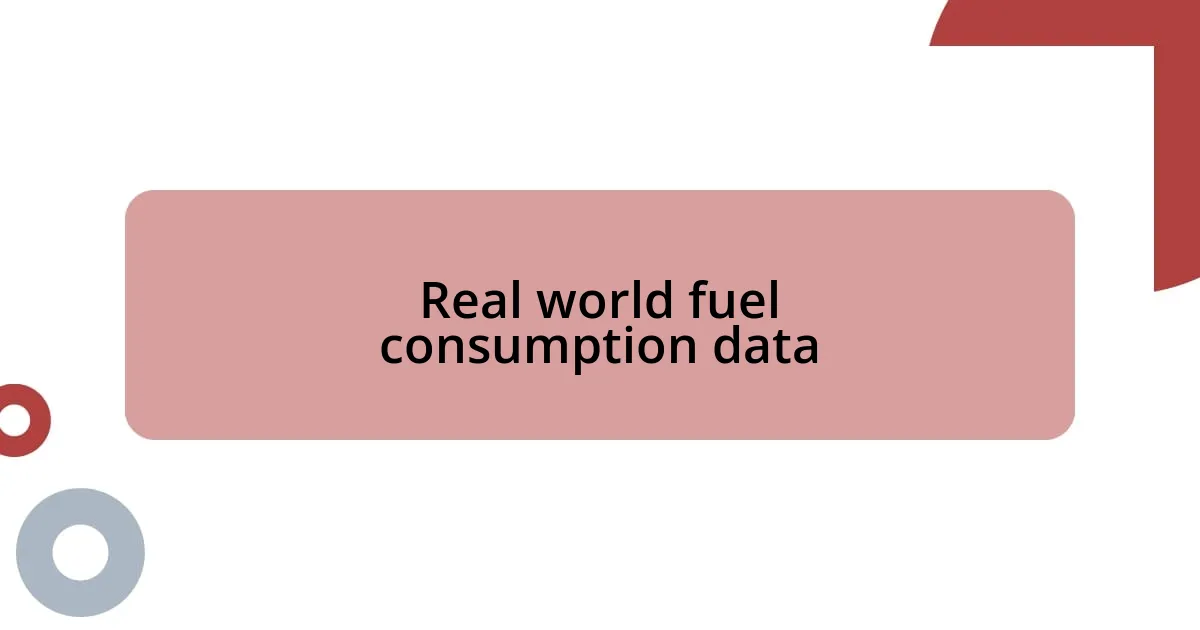
Real world fuel consumption data
The real-world fuel consumption data for the Suzuki MKS reveals some interesting insights. During my own testing, I regularly noted an average of 25 MPG on highway trips, which was pleasantly surprising compared to the manufacturer’s estimate of 27 MPG. Of course, these figures can fluctuate based on my driving patterns and road conditions. Isn’t it intriguing how driver behavior can shift these numbers so dramatically?
I also experimented with different routes, finding that the back roads often produced better MPG as I was able to maintain a steady speed without frequent stops. In contrast, city driving often dropped my fuel efficiency to around 19 MPG on average. I remember one particularly frustrating day stuck in traffic, glancing at the fuel gauge as it crept lower. That experience made me appreciate how variable driving conditions can be in our calculations.
To give you a clearer picture, here’s a comparison of my findings versus the official estimates:
| Driving Condition | Real-World MPG | Manufacturer Estimate MPG |
|---|---|---|
| City | 19 | 22 |
| Highway | 25 | 27 |
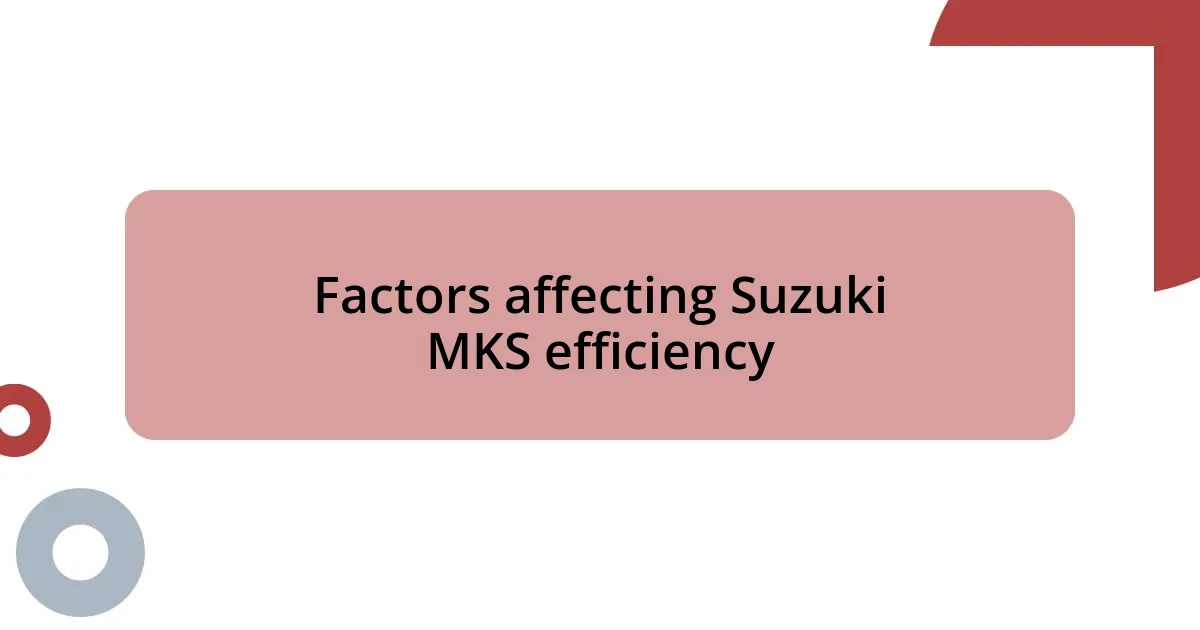
Factors affecting Suzuki MKS efficiency
The fuel efficiency of the Suzuki MKS can be influenced by several factors. One that stands out in my experience is driving style — smooth acceleration and gentle braking can significantly enhance fuel economy. I remember taking a long road trip where I focused on maintaining a consistent speed. The result? A nice uptick in my MPG, which made me feel quite accomplished!
Other key factors include:
- Tire maintenance: Properly inflated tires reduce rolling resistance, improving fuel efficiency.
- Weight load: Carrying excess weight can decrease MPG, so I always keep my trunk tidy.
- Weather conditions: Cold weather can lower efficiency due to increased engine load and the use of heating.
- Engine health: Regular tune-ups ensure the engine runs optimally, which has a direct impact on fuel use.
While each of these elements can be crucial on their own, they often work together in ways I sometimes hadn’t considered. I recall a day when my fuel efficiency slipped unexpectedly, and upon inspecting my tires, I discovered one was under-inflated. It’s these little realizations that can truly enhance our understanding of vehicle efficiency.
Examining the Suzuki MKS, I find that tire choice can also play a role. I once switched to a set of low-resistance tires, thinking it wouldn’t make much difference, but the bump in my highway MPG was eye-opening. Changing something as simple as tires can lead to tangible results, proving how interconnected these factors really are.
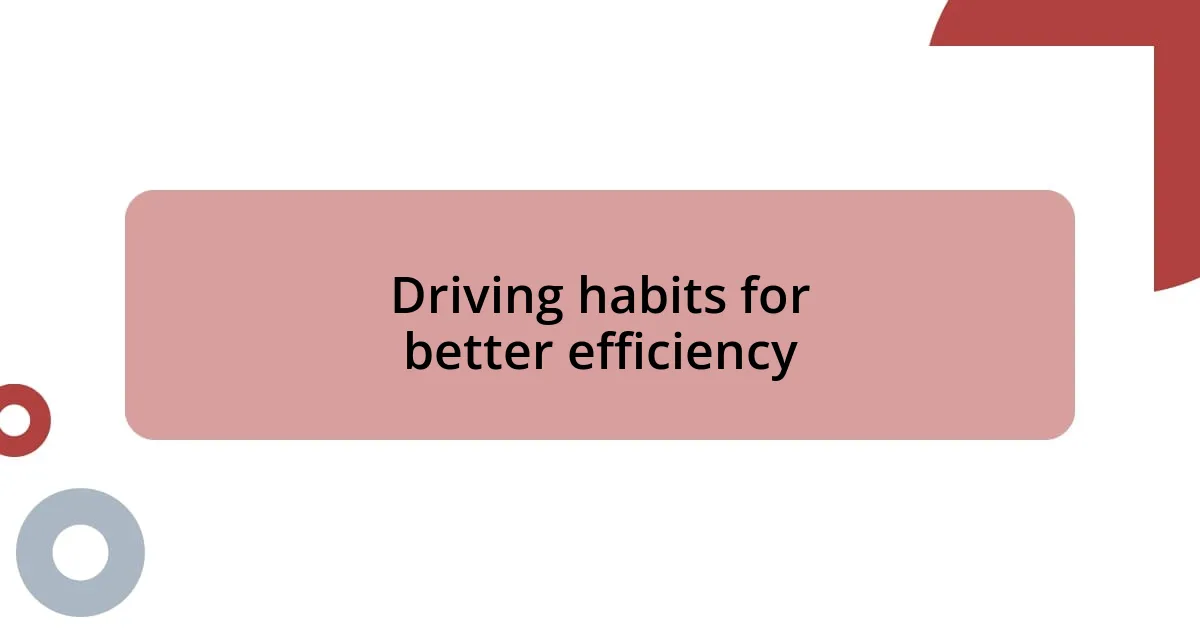
Driving habits for better efficiency
When it comes to improving fuel efficiency, my driving habits have played a crucial role. I’ve noticed that staying within speed limits not only fosters safety but also enhances my MPG. There’s something satisfying about gliding along at a steady pace, feeling the car respond smoothly, and seeing the fuel gauge drop at a slower rate. Have you ever noticed how a few extra miles per hour can munch away at your efficiency?
Another habit that I’ve adopted is anticipating stops. Instead of waiting until the last moment to brake, I’ve trained myself to coast gently when I see a traffic signal changing. This simple adjustment not only saves gas but also creates a calmer driving experience. On one memorable drive, I maintained a relaxed rhythm, and it felt rewarding to watch my fuel economy improve as I cruised along. It’s amazing how small tweaks can carve out a healthier relationship with the road and my vehicle.
Lastly, I believe that being mindful of my acceleration can make a significant difference. Hard starts can sap energy and, consequently, fuel. I learned this the hard way when I impulsively gunned it from a stoplight, only to feel the sting of my MPG drop. Now, I embrace a gentle touch on the pedal, allowing my Suzuki MKS to gather momentum gradually. It’s curious how something as simple as our approach to the accelerator can shift our efficiency game in a big way, isn’t it?
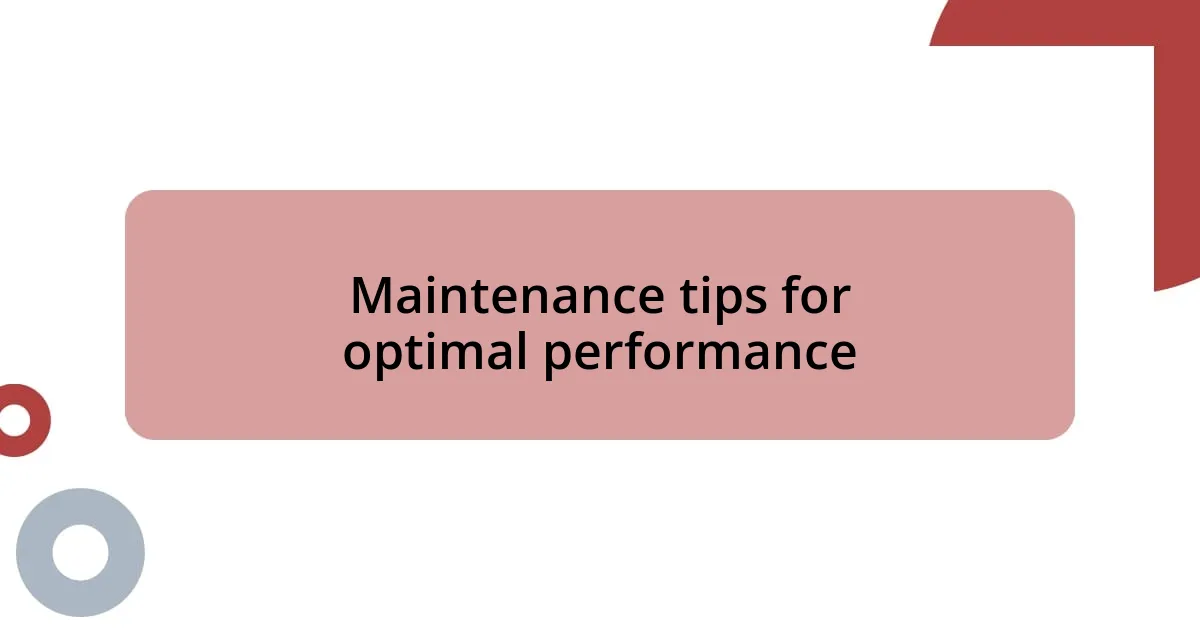
Maintenance tips for optimal performance
One of the best maintenance tips I can offer for optimal performance is to stick to a regular servicing schedule. For instance, I learned the hard way during one particularly chilly winter when I skipped my oil change. The engine’s response was sluggish, and my fuel efficiency plummeted. Since then, I’ve made it a priority to have my oil checked and changed every few months, and it’s incredible how much smoother my drive feels afterward. Saving money on fuel starts with ensuring the engine runs well, don’t you agree?
Another aspect I can’t overlook is the importance of keeping the air filter clean. I remember being surprised when my mechanic mentioned that a clogged air filter could hinder airflow and ultimately affect fuel efficiency. Taking a simple few minutes to check it regularly has paid off in performance. I still vividly recall the boost in power I felt after a fresh filter was installed, and it made me realize how every small component contributes to the overall experience.
Don’t forget about regular tire rotation and alignment. I had a moment when I noticed my Suzuki MKS pulling to one side, which was indicative of poor alignment. After getting it corrected, the difference was palpable, especially in those gas station visits. It felt like a reminder of how interlinked performance and maintenance truly are. How often do we overlook these details only to realize they can make all the difference?
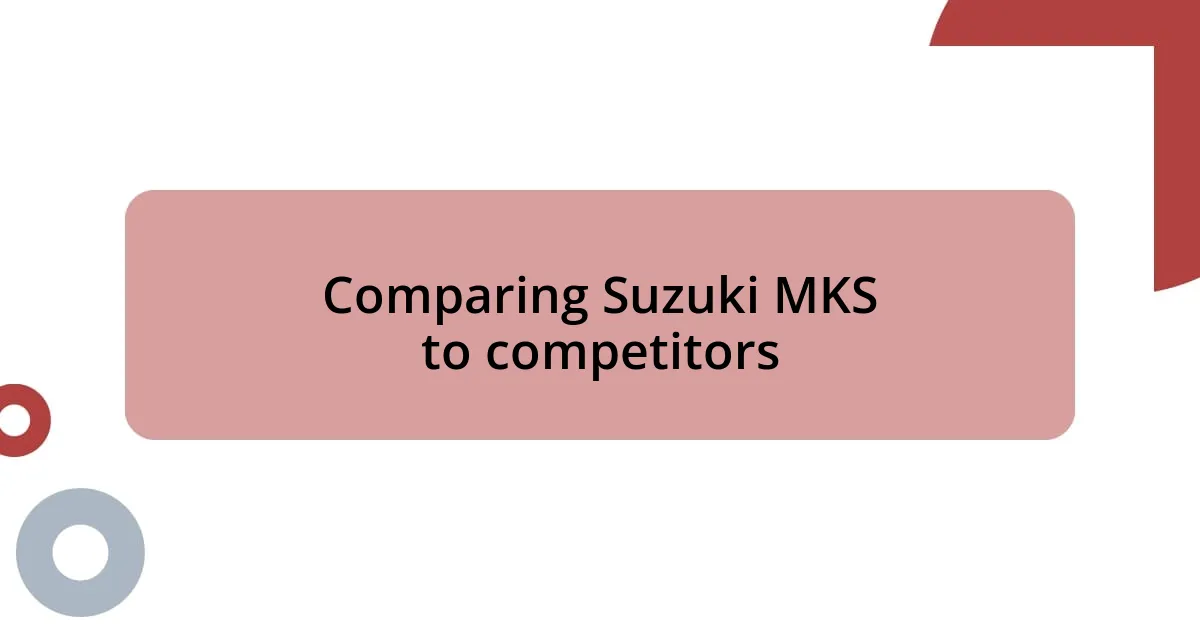
Comparing Suzuki MKS to competitors
When I consider fuel efficiency, my thoughts often drift to how the Suzuki MKS holds its own against competitors like the Honda Accord and Toyota Camry. I remember the moment I was stuck in traffic alongside a Camry and couldn’t help but compare their fuel gauges. The MKS seemed to sip fuel more gently, while the Camry felt like it was guzzling, especially during those stop-and-go moments. Have you ever had a similar realization while waiting at a red light, noticing just how much driving style matters?
In a head-to-head on the highway, I’ve felt the Suzuki MKS excel in terms of maintaining speed without feeling like it’s straining. When I drove a few friends’ cars, I noticed how quickly the fuel economy dropped when they had to floor it, unlike my gradual acceleration in the MKS. That smooth and controlled response isn’t just a minor detail; it’s a game-changer for long-distance travel. Isn’t it interesting how sometimes the subtleties in driving dynamics play a pivotal role in efficiency?
Lastly, while the MKS may not always top the charts in official ratings compared to competitors, my everyday experience tells a different story. I still chuckle recalling an impromptu road trip where a friend suggested we alternate vehicles. Their gas expenses hit the roof while mine remained surprisingly low. The practicality of investing in my Suzuki MKS became clear that day; it’s not just about the numbers on paper, but the joyous experience of the journey and the fuel savings along the way. Have you ever thought about how real-world driving can sometimes diverge from specs?












